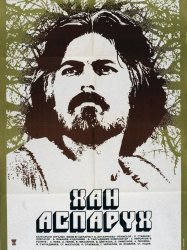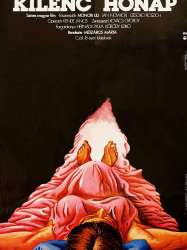Zift is a bulgare film of genre Drama directed by Javor Gardev released in USA on 27 june 2008 with Đoko Rosić
Zift (2008)
Dzift

If you like this film, let us know!
- Infos
- Casting
- Technical infos
- Photos
- Videos
- Film quotes
- Characters
- Music
- Awards
Zift (Bulgarian: "Дзифт", "Dzift") is 2008 black-and-white Bulgarian film that combines neo-noir and black comedy with socialist retro motifs; it is based on Vladislav Todorov's 2006 eponymous novel who also wrote the script. Zift was directed by Javor Gardev and premiered on 27 June 2008 at the 30th Moscow International Film Festival, where it won a Silver George for Best Director and the Best Film Prize of the Russian Film Clubs Federation.
The film stars Zachary Baharov as Moth, the main character who organizes a robbery out of love and money and is imprisoned before the 9 September coup d'état for a murder he did not commit. Moth is released from jail in the 1960s to meet the new and unfamiliar reality of socialist Sofia. Zift's name is derived from the Arabic loanword zift or dzift, meaning "asphalt" "bitumen" or "black pitch", once a popular chewing substance among the gangs in Sofia asphalt jungle; the word is also claimed to be urban slang for shit.
^ Allison, John (2008-09-07). "TIFF 08: Review of ZIFT". Quiet Earth. Retrieved 2008-10-15.
^ "30th Moscow International Film Festival (2008)". MIFF. Retrieved 2013-06-01.
^ ""Дзифт" взриви Московския кинофестивал" (in Bulgarian). e-vestnik.bg. 2008-06-29. Retrieved 2008-10-15.
Synopsis
Zift's plot unfolds non-linearly: although the main story after Moth's release from prison is told chronologically, the events leading to his imprisonment are revealed by means of numerous relatively long and not necessarily chronological flashbacks. The story is presented chronologically here.Actors

Đoko Rosić
(Priest)

Zachari Baharov
(Moth)
Comments
Leave comment :
Suggestions of similar film to Zift
There are 12 films with the same actors, 0 films with the same director, 72126 with the same cinematographic genres (including 7 with exactly the same 4 genres than Zift), to have finally 70 suggestions of similar films.If you liked Zift, you will probably like those similar films :

Double Identity (2010)
, 1h40Directed by Dennis Dimster
Origin USA
Genres Thriller, Action, Adventure, Crime
Actors Val Kilmer, Izabella Miko, Hristo Chopov, Zachari Baharov, Julian Wadham, Didem Erol
Rating45%





An American doctor, Dr. Nicholas Pinter (Val Kilmer), working in Bulgaria for Doctors Beyond Borders, is mistakenly identified as a secret agent by the Russian mob. He escapes a close brush with death and is then rescued by the British Secret Service and a beautiful but mysterious woman named Katrine (Izabella Miko). His life dramatically changes when he helps this mysterious woman escape from her would-be assailant.

Werckmeister Harmonies (2001)
, 2h25Directed by Béla Tarr, Tommy Wiseau
Origin Hongrie
Genres Drama
Actors Hanna Schygulla, Đoko Rosić, János Derzsi, Ferenc Kállai
Rating79%





The film can be seen as an allegory of post-World War II Eastern European political systems - told as a black-and-white cinematic poem with 39 long, single-camera takes. It examines the brutalization of a society, its political systems and ethics through the metaphor of a decaying circus whale and its star performer. It is set in a desolate, isolated small town in Hungary during Soviet times.

Aesop (1970)
Directed by Rangel Valchanov
Genres Drama
Actors Georgi Kaloyanchev, Stoyanka Mutafova, Đoko Rosić, Konstantin Kotsev, Petr Čepek, Rangel Valchanov
Rating67%






The Truck (1980)
, 1h48Directed by Christo Christov
Genres Drama
Actors Grigor Vachkov, Đoko Rosić
Rating66%





 , 5h23
, 5h23Directed by Ludmil Staikov
Origin Bulgarie
Genres Drama, War, Biography, Historical
Actors Đoko Rosić, Peter Slabakov, Iossif Surchadzhiev, Velko Kanev, Georgi Cherkelov, Anya Angelova Pencheva
Rating86%






Brady’s Escape (1983)
, 1h36Directed by Pál Gábor
Genres Drama, War, Action
Actors Ildikó Bánsági, Đoko Rosić, Kelly Reno, John Savage
Rating58%





Un aviateur américain s'écrase en Hongrie, au cours de la Seconde Guerre Mondiale. Il va déjouer l'ennemi nazi grâce à l'aide de cowboys magyars ...

Passion (1998)
, 2h35Directed by György Fehér
Genres Drama
Themes Films about sexuality
Actors Ildikó Bánsági, Đoko Rosić, János Derzsi, Zoltán Bezerédy
Rating73%






Rose's Songs (2003)
, 1h38Genres Drama
Themes Political films
Actors Franco Castellano, Maia Morgenstern, Ildikó Bánsági, Đoko Rosić, Zoltán Gera, Piroska Molnár
Rating60%





Autumn 1944. Yellow star, ghettos, Arrow Cross terror. The inhabitants of Hungary's capital, Budapest, await the tragic fulfilment of their fate with helpless resignation. However, above one of the city's villas, once a week in the evening the stars of hope sparkle, if only for a few minutes. This short time gives fresh heart to those hiding here and kindles hope in their tortured souls to live for another day. This mysterious power is none other than a beautiful song that can be heard at such times from the villa's tower room. Géza Halász, the villa's always jovial caretaker, believes no Jew has reason to fear while the owner of the voice, Imre Rose, the world-famous opera singer and a Jew himself, remains in Budapest and does not flee from the country in spite of his American, British, Swiss, Swedish and Vatican connections. Halász visits the singer every Friday to dine with him. After a while the marvellous, hope-inspiring concert starts, which is listened to by the hiding inhabitants of the house with enraptured faces through the villa's open dumb waiter. Already in the "palmy years of peacetime" Rose had competed with Csortos, the famous actor, for the title of "Budapest's Greatest Misanthrope". Thus it does not surprise anybody that the eccentric singer never, not even once, tries to make contact with his fellow Jews who took refuge in his house. And when Halász recounts that the singer swore within an hour of the Arrow Cross's seizing power that he would not utter a single word nor cross the threshold of his tower room until "Andrássy Avenue has been purged of this Arrow Cross scum", even the slightest suspicion about Rose's "invisibility" vanishes. Only a fourteen-year-old boy, Tommy, the caretaker's son, listens to the weekly song with curiosity combined with suspicion, and tries to find out about the secret of the tower room. As a result of the adolescent's persistent and undaunted inquiries, the opera singer's mystery is unveiled. Meanwhile, however, almost unnoticed, the events of the calamitous days, filled with excitement and cheerfulness, turn the boy into a truly adult man. The story of THE SONGS OF RÓZSA is based on true events.

Love.net (2011)
, 1h49Directed by Ilian Djevelekov
Genres Drama, Romance
Actors Hristo Chopov, Dilyana Popova, Zachari Baharov
Rating71%





Suit les histoires parallèles d'un certain nombre de personnages qui tentent de changer leur vie via Internet ou qui s'amusent simplement en ligne.

Nine Months (1976)
, 1h28Directed by Márta Mészáros
Origin Hongrie
Genres Drama
Actors Jan Nowicki, Katalin Berek, Đoko Rosić
Rating65%





Juli est employée dans une briqueterie. Elle a interrompu ses études afin de pouvoir élever, seule, son enfant. Elle continue néanmoins de préparer le soir un examen. Elle entretient une liaison avec son contremaître, János. Lorsqu'elle est enceinte, János accepte de l'épouser, mais lui impose son autorité. Elle le quitte pour ces raisons-là. Elle préfère accoucher seule : peu importe le prix qu'elle paiera, l'essentiel est qu'elle puisse conserver son autonomie.
 Connection
Connection